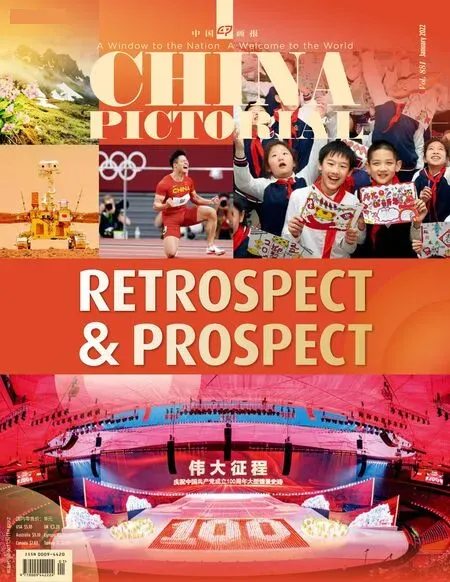Memorable Events of the Year
by Li Zhuoxi
In 2021, the Communist Party of China (CPC) celebrated its centenary, completed construction of a moderately prosperous society in all respects, and eradicated absolute poverty throughout the country.
Despite various risks and challenges, China continued to promote high-quality development and deepen its reform and opening up. Many major breakthroughs were achieved in scientific explorations including sending astronauts to the country’s space station, commencing operation of China’s next-generation artificial sun, and successfully landing the Zhurong rover on Mars. What’s more, construction of the Guangdong-Hong Kong-Macao Greater Bay Area has entered a fast lane. The country has entered the Winter Olympics time and is eager to release its unlimited “ice and snow potential.”
The world, however, was still full of uncertainty in 2021. Extreme weather events occurred frequently around the world, the COVID-19 pandemic continued raging, and the global economy remained fragile. In this context, China has realized the importance of building a community with a shared future for all mankind now more than ever.
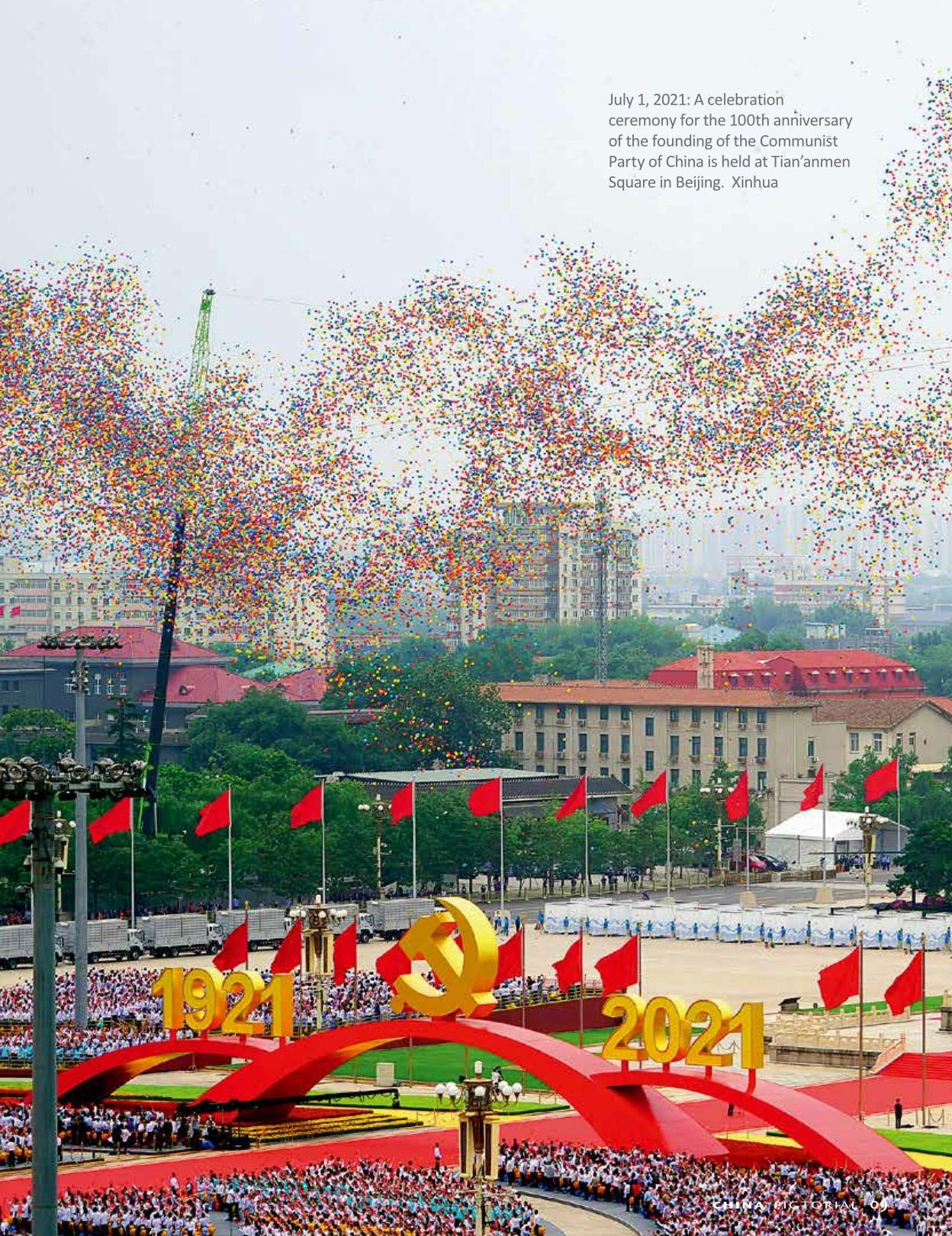
CPC’s Centenary
The year 2021 marked the 100th anniversary of the founding of the CPC. From November 8 to 11, the 19th CPC Central Committee held its sixth plenary session in Beijing. The meeting comprehensively reviewed the Party’s major achievements and experience in its century-long history.
The CPC has grown from a political party with only a few dozen members when it was founded to the world’s largest political party with more than 95 million members. It has been China’s ruling party for 72 years, with its global influence continuing to grow. It has led China to transform from a large but poor and weak nation to the world’s second-largest economy. An important secret for its remarkable achievements has been a people-centered philosophy.
Poverty Reduction Approach
On February 25, 2021, China declared to the world that absolute poverty had been eradicated in the world’s most populous country.
On April 6, China’s State Council Information Office issued a white paper titled“Poverty Alleviation: China’s Experience and Contribution.” The white paper recorded the great course of China in the elimination of absolute poverty, outlined the country’s exploration and practices in global poverty reduction, and shared its experience in poverty alleviation. The number of Chinese people lifted out of poverty in the last 30 years accounts for more than 70 percent of the world’s total. Besides, China has achieved the UN Sustainable Development Goals on poverty reduction 10 years ahead of schedule.
50th Anniversary of Return to the United Nations
October 25, 2021 marked the 50th anniversary of the restoration of the People’s Republic of China’s lawful seat in the United Nations.
Over the five decades, China has implemented the principles of the Charter of the United Nations with real action, upheld the international system with the United Nations at its core and the international order underpinned by international law, practiced true multilateralism, and protected the interests of developing countries. China has pledged to continue to be a builder of world peace, a contributor to global development, a defender of the international order, and a provider of global public goods.
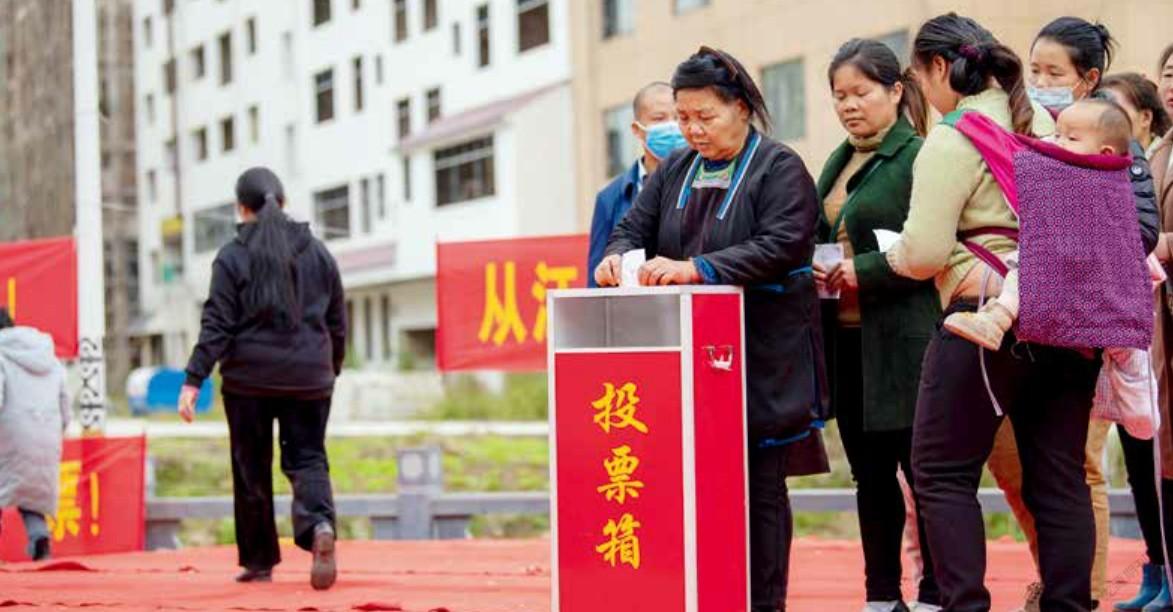
China’s Democracy
On December 14, 2021, China’s State Council Information Office released a white paper titled “China: Democracy That Works,”which comprehensively summarized the remarkable achievements of China’s democratic development and explained in depth values, concept, system, implementation procedures, participation practices, and world significance of China’s whole-process people’s democracy.
Whole-process people’s democracy is a distinctive feature of China’s democracy. Under the tremendous social governance challenge brought by the COVID-19 pandemic, the characteristics and advantages of China’s whole-process people’s democracy have become increasingly clear. As a socialist democracy, China’s democracy integrates procedural democracy with substantive democracy, and process-oriented democracy with results-oriented democracy, aiming to pinpoint solutions to the real problems emerging in people’s lives.

20 Years in WTO
The year 2021 marked the 20th anniversary of China’s accession to the World Trade Organization (WTO).
Joining the WTO profoundly changed the relationship between China and the global trading system and enabled China to optimize its comparative advantages and rapidly develop into one of the most important players in global trade and investment. It also promoted the reform of China’s domestic economic system and stimulated the vitality of market players. China’s accession to the WTO has improved the world economic system, greatly expanded the coverage of multilateral economic and trade rules, and further enhanced the global industrial supply chain. China’s annual contribution to world economic growth has measured about 30 percent for many consecutive years.
China’s Space Station
On June 17, 2021, the Shenzhou-12 manned spaceship was launched. Three Chinese astronauts, Nie Haisheng, Liu Boming, and Tang Hongbo, successfully reached China’s Tiangong space station. It was the first time that Chinese astronauts entered their own space station. On October 16, launch of the Shenzhou-13 spaceship commenced a six-month mission for another three Chinese astronauts Zhai Zhigang, Wang Yaping, and Ye Guangfu on the Chinese space station.
Space is the common wealth of mankind, and space exploration is the common cause of all mankind. Since the launch of China’s manned space program, it has successively carried out extensive exchange and cooperation with the United Nations Office for Outer Space Affairs (UNOOSA), the European Space Agency, the Italian Space Agency, and space agencies in other countries and regions. The China Manned Space Agency (CMSA) also signed a memorandum of understanding with UNOOSA and selected nine projects from 17 countries for scientific experiments aboard China’s space station.
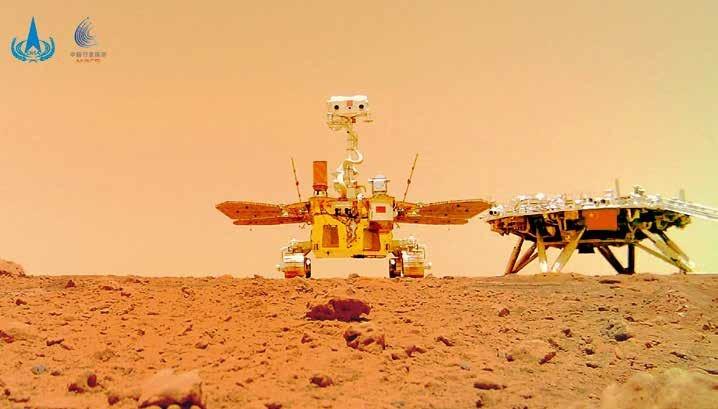
Mars Rover Zhurong
On May 15, 2021, China’s “Tianwen-1” probe landed on Mars. Seven days later, the Mars rover “Zhurong” safely drove away from the landing platform and started patrolling and exploring Mars. The landing marked an important step of China’s space exploration and a leap from exploration of the Earth-Moon system to interplanetary exploration.
China’s Mars exploration mission has been assisted by many international partners such as the European Space Agency, and the space agencies of France, Argentina, and Austria. The China National Space Administration has expressed eager willingness to cooperate with global space agencies, space scientific research institutions, and space exploration enthusiasts to jointly explore the mysteries of space.
Great Future of the Greater Bay Area
February 18, 2021 marked the second anniversary of the release of the Outline Development Plan for the GuangdongHong Kong-Macao Greater Bay Area.
The Guangdong-Hong Kong-Macao Greater Bay Area is not only an economic region, but also an integration of diverse cultures. From the perspective of the global “bay area” economy, culture is an important manifestation of “soft power” in such bay areas.
The 11 cities in the Guangdong-Hong Kong-Macao Greater Bay Area share dialects and Lingnan cultural memories from the same origin. At the same time, the diverse, open and inclusive spirit formed in the process of cultural exchange between China and foreign countries has become an important foundation of the construction of a Cultural Bay Area.

70th Anniversary of Tibet’s Peaceful Liberation
The year 2021 marked the 70th anniversary of the peaceful liberation of Tibet.
From ancient times to the present, the Tibetan people on the snow-covered plateau have created a rich and colorful culture highlighted by the majestic Potala Palace, King Gesar hailed as the “Homer’s epic in the East,” and thangka, the “encyclopedia of Tibetan culture.” Before the peaceful liberation of Tibet in 1951, the theocratic serfdom system stifled the vitality of Tibetan society, and caused a decline in traditional Tibetan culture.
The peaceful liberation of Tibet commenced a new era of the protection and development of Tibetan culture. Over the past 70 years, the strong support from the government has enabled the intangible cultural heritage of Tibet to be effectively protected, inherited, and developed. Tibetan culture has brightened its old mysterious colors and emerged from the snow to warm the world.
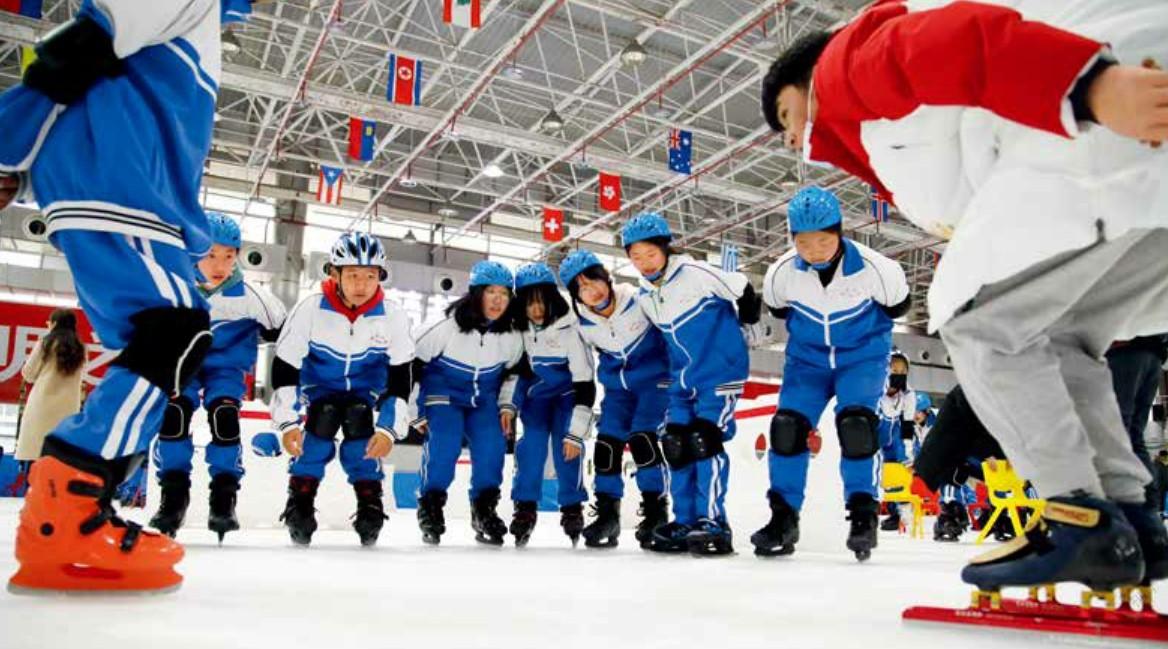
Together For a Shared Future
On February 4, 2021, the Beijing 2022 Winter Olympics started the one-year countdown, bringing China into “Winter Olympic Time.”
Attracting 300 million people in China to winter sports was a solemn promise made by China to the international community when it bid for the 2022 Winter Olympics. This vision is now gradually becoming reality. The China Sports Tourism Consumption Big Data Report (2021) released by the China Tourism Research Institute estimated that the 2021-2022 winter season would lift the number of Chinese ice and snow tourists to 340 million, generating earnings of 680 billion yuan(US$107 million).

The Kunming Declaration
From October 11 to 15, 2021, the 15th meeting of the Conference of the Parties to the UN Convention on Biological Diversity (COP15) was held in Kunming, Yunnan Province, at which the Kunming Declaration was adopted.
A report released by the United Nations Environment Programme shows that among the eight million plant and animal species on the planet, approximately one million are facing the threat of extinction. Many of these species will become extinct within a few decades, more than at any time in human history.
The Kunming Declaration was adopted by more than 100 countries and called for urgent and comprehensive actions to achieve transformational changes in all economic sectors around the world, reflecting the political will to resolve the biodiversity crisis. Starting in Kunming, global biodiversity governance will set off anew.

Artificial Sun
Chinese scientists set a new world record by achieving a plasma temperature of 120 million degrees Celsius for a period of 101 seconds in a recent experiment, a key step toward test operation of a fusion reactor.
Compared with the current heavy nuclear fission method adopted by nuclear power plants, the biggest advantage of nuclear fusion is that it does not produce nuclear waste and is stable and safe. In addition to building its own “artificial sun,” China is also an important partner of the International Thermonuclear Fusion Experimental Reactor Program (ITER). Currently, Chinese professionals account for nearly 10 percent of ITER’s total employees, second only to those from the European Union. If the creators of the “artificial sun” can contain the energy of thermonuclear fusion, the technology could produce almost unlimited clean energy.

Extreme Weather
On July 20, 2021, a severe rainstorm attacked parts of Henan Province. Rainfall in Zhengzhou reached 201.9 mm per hour, which exceeded any previous hourly rainfall record on the Chinese mainland. The flood caused by the rainstorm affected 13.7 million people in the province and caused direct economic losses of 88.5 billion yuan (about US$14 billion).
However, this was only a microcosm of the increasingly frequent occurrence of extreme weather events around the world in 2021. The “storm of the century” in Western Europe caused hundreds of casualties, and the extreme high temperatures in western North America triggered devastating wildfires. The world is experiencing an unprecedented rise of extreme weather events.
The report “Climate Change 2021: Natural Science Basis” issued by the United Nations pointed out that over the next few decades, global climate change will intensify, and extreme high temperature and precipitation events will become more frequent. More and more climate experts have formed a consensus: Although not every extreme weather and climate event can be attributed to climate change, it should be a wake-up call for mankind.

